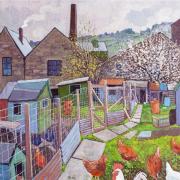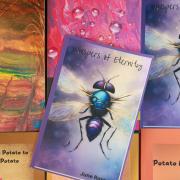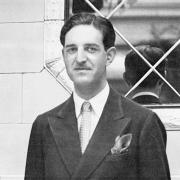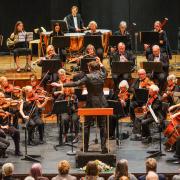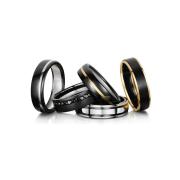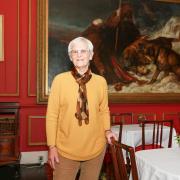Come rain or shine, this dedicated team of volunteers will be on the roads helping save lives. Rebekka O’Grady reports

Over half a million miles have been covered since 2012 by the volunteers of North West Blood Bikes Lancashire and Lakes. In those five years, the charity has completed over 42,000 runs – and counting – between hospitals across Lancashire and the Lake District, delivering bloods, platelets, samples, breast milk and anything that will fit on a motorbike.
‘I never imagined we’d be where we are now, it’s overwhelming,’ said founder and chairman, Paul Brooks. The retired police officer and collision investigator from Chorley formed the Lancashire and Lakes division after seeing an advert on television. After making a few enquiries, he saw that the hospitals had a need for the services that the bikers could offer. ‘We are now the largest and busiest blood bikes in the world, it’s extraordinary.’
From starting with 20 volunteers in May 2012, today there are 366 members who range from riders and controllers to fundraisers and even a bishop – all giving up their time for free to help others in need. ‘On the first night, we didn’t receive a single call,’ laughed Paul. ‘One volunteer even slept in his leathers on the couch waiting to be called out. However, in that first ten months we did 500 runs and 16 weeks later had completed another 500. It just got so busy and snowballed from there. We now average 1,100 runs per month.’
The charity, which last year received the Queen’s Award for Voluntary Services, started by helping hospitals in Chorley and Preston, but soon grew to cover Ormskirk, Southport, Blackburn, Burnley, Morecambe, the Fylde, Barrow-in-Furness and Kendal.

Riders collect and deliver urgently needed whole blood, platelets, samples for analysis, medication, patient notes, small medical instruments and donor breast milk for neo-natal babies among other things, between NHS hospitals free-of-charge. The blood bikers receive no payment for their services and receive no central funding. As you can imagine, running a service like this is costly so fundraising is crucial to maintaining and fuelling the fleet.
The volunteers operate every day (including bank holidays and even Christmas Day and New Year’s Eve) outside of normal working hours from 7pm-2am diring the week, and a 24 hours service is split into two shifts at a weekend. They also take part in long relays delivering items across the UK in conjunction with other Blood Bike groups.
‘The hospitals see it as a positive thing. One run we do cancels one taxi they would have had to pay for, so it’s a huge saving for them,’ explained vice chairman, Lee Townsend. ‘We’re certainly a form of an emergency service. We will transport anything we can fit on the bike, but no members of staff. I was asked once to give a lift to a midwife!’
As well as the riders working through all conditions in the night to deliver these vital supplies, the controllers handling the phone calls have a job that’s just as important. Lee explains that if they didn’t have a rider to cover one area, then they could shut that particular zone down. However if they didn’t have a controller, the whole operation would have to close. ‘They are the unsung heroes,’ Lee said. ‘We as the riders are the visible side of the charity, but without the controllers it wouldn’t happen. It’s the synergy of all forms of the charity coming together that make it work.’

Controllers work from home using their own phone and computer to receive calls and then dispatch a rider. All the hospitals served by the Blood Bikes call one number which is re-directed to the volunteer, who then looks at a spreadsheet and contacts the on duty rider or riders in the area of the hospital.
‘When you’re out on a ride, it can be scary but you have to learn to temper the adrenaline. It’s crucially important you don’t let it get out of control because if you don’t get there, it’s two people in trouble,’ said Lee, a company director in Lytham St Annes, who joined the charity to give something back to the NHS. ‘Safety is paramount and other drivers on the road are becoming increasingly aware of who we are so they do give us the space we need. If it’s a blue light call then you know it is life or death for someone.’
The team have a fleet of 12 liveried bikes equipped with emergency lights and sirens, and all who ride these bikes must have advanced qualifications and undergo specialist training to use the emergency equipment. However, to ride your own bike all you have to do is have an assessment ride with one of the instructors to make sure you’re safe. When the temperature drops below three degrees outside, for the safety of the rider and the item they are delivering, the volunteers will use their cars.
‘I had not long passed my test when we signed up,’ said Leyland volunteer Karen Carton, who along with her husband Colm has been volunteering for two years. ‘That’s when I learnt that you had to have had your license for 12 months before riding, so I spend three months as a controller while Colm was on the road. I remember when the time came to do my assessment ride, it was teaming with hail!

‘I’ve had four children and Colm had testicular cancer, so between us we have taken a lot out of the NHS and we thought it was time to put back in. They ask you to do a minimum of two shifts a month; as I work a 60 hour week I do a Saturday night. Sometimes you get no calls, other times you’re out all evening in all weathers, but it’s really worth it.’
To volunteer or donate to North West Blood Bikes Lancashire and Lakes, visit www.nwbb-lancs.org.






